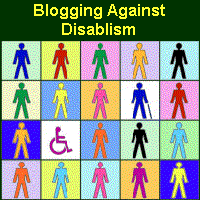
To be honest, I don’t get it. Mostly because ablism and disablism are sort of the same things. Anyway, that’s just me who gets borked by works. You can read more at Diary of a Goldfish: Blogging Against Disablism Day - 1st May 2006.
I have very little to do with the disability community aside from helping out with http://gimpgirl.com/ and the Adaptive Design Association, and visiting sites like Wrong Planet. Most of my education comes from Aleja, Jen and Nick, and to a large extent from my students. Early Childhood Education students that I’ve worked with have all done what they call ’special needs’ placements, and some how are returning for graduate work have years of experience working with special needs children.
What I’ve noticed that strikes me is how few of the people I know who are well aware of disability actually have worked with someone in a position of power (teacher, boss, administrator) who lived with a disability. I know of only one, myself. And I have 2 colleagues at school who I personally interact with who have issues that would be considered disability issues.
I think we end up with a cultural attitude that people with disabilities must be serviced and cared for. Of course people with disabilities must be accommodated and buildings must be made more accessible. And when we’re dealing with people who have cognitive challenges, appropriate supports to enable them to do the work in an equitable environment. I assume that if you remove systemic barriers to access, then whatever our challenges, we can do the jobs to the best of our abilities. That doesn’t mean that I who is math impaired has a right to do math, and have to be accommodated. It means that if my job is to teach and do research, but I have a visual impairment that does not make it difficult to do my job, but makes it difficult for me to get to class or recognize students faces, then those barriers must be accommodated, to allow me to do the job I’ve been hired for. If I have mobility issues, and our transit system is unreliable, how can I get a job and show up on time if the system does not support me to move around town as easily as everyone else. Toronto’s really bad, IMHO, in terms of accessible public transit.
We need more David Onley figures, but he’s too distant. We need more people with disabilities living IN our communities, having families, taking their kids to school, being teachers, doctors, lawyers, and not just people at a distance. Strangely enough, there probably are a lot of people in that position, but because they can ‘pass’ for ‘normal’ and they know the stigmas that are attached to disability, they prefer to stay quiet.
Everyone knows that I’ve been assessed as high functioning autistic/Aspergers if you’ve been in my class, though I’ve only hinted at it in other places, but that’s because I’ve been told by friends to not talk about it. Something to be ashamed of, or at least hidden. The problem with that is that the solution, or a solution, to dealing with dis/ablism issues is to not hide, but to be out there, intimate and interactive… as with other forms of discrimination, fear and ignorance are best countered with experience and engagement.
That’s all I have to say about that.
![]()
